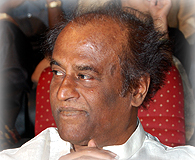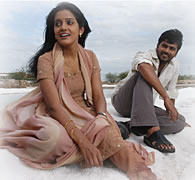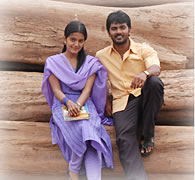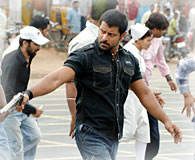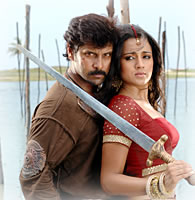| Kuselan- Super Star's next film | ||
| By Behindwoods News Bureau. | ||
| January 14, 2008 | ||
| ||
Rajnikanth has ensured to sustain the exhilaration among his fans by featuring in a film to be produced by Kavithalaya and directed by P Vasu. |
Tuesday, January 22, 2008
Kuselan- Super Star's next film
Pidichirikku
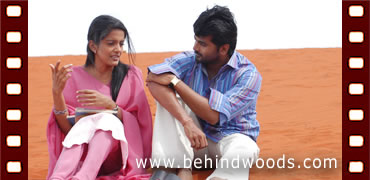 | |||
| |||
Director Kanagu, erstwhile assistant director to Linguswamy, debuts with Pidichirukku for producer Senbagakumar. Incidentally, Kanagu assisted Lingusamy during the making of the much-delayed Bheema that is now making it to the theaters alongside Pidichirukku. The movie stars Ashok as the hero (in his second film, after the average grosser Muruga) and debutant Visaka as the heroine. | |||
| |||
| |||
| |||
| |||
Bheema Movie Review
 | ||||||
| ||||||
Bheema became one of the longest awaited Tamil movies of recent times not just for the hype it created but also for the time it took, from completion to release. And when a movie is usually this delayed, the hype and hoopla surrounding it fizzles out, but Bheema only became bigger with expectations rising with each passing day. There are several reasons for this: One, this is Vikram’s first movie after two years. Two, Vikram and Trisha pair up for the first time since the extremely successful Saami. Three, Bheema is Lingusamy’s follow-up to the stupendously successful Sandakozhi. And four, Harris Jeyaraj’s soulful songs. But here’s the lowdown: in spite of all the above reasons, the movie doesn’t quite live up to its colossal hype. | ||||||
| ||||||
| ||||||
| ||||||
Ahmed Khan’s choreography is understated and tasteful. Harris Jeyaraj’s music, of course, is very good. Unfortunately, some of his songs are inappropriately placed in the film, taking away some of the luster. However, “Oru Mugamo” and “Ragasiya Kanavugal” are memorable numbers that are also shot beautifully. For pure lovers of action, Bheema might just be the Pongal movie they are looking for, but those expecting an action movie with a strong story will be disappointed. | ||||||
Strangers

| ||||||
| As per the self- explanatory title, the film is a thriller-sort, involving two people who meet each other for the first time. So you have a suited, stiff-smiled Mr Rai (Kay Kay Menon, superbly restrained), and a floppy haired guy Rahul (Jimmy Shergill, chubby), talking psychology mumbo-jumbo, like how writing is like going to the loo, because both are a release of pressure. They should have named this film stranger, for one is yet to hear stranger dialogue. As they keep talking, cautious at first, they eventually pour out each other’s hearts and tell their sad stories. Rai had a fairly happy marriage, but his six-year-old son tragically died in an accident. The incident took an irreparable toll on his marriage. Rahul, a flop writer, who refuses to get a job, is going through wedding turmoil as well, and they both want out, but how? So they hatch a sinister plan to free each other of their dreary lives. It’s bizarre, because both seem educated, and there is no talk about how they’ll be able to escape the law. Still, you might be tempted to sportingly ignore such details and concentrate on what might happen ahead. Then come the mandatory twists and turns at a speed faster than the train the two were traveling in. To give the script its due, some of the surprises are truly riveting, and makes you want to know what’s next. There are some interesting moments through the film; and issues sensitively handled, like the breakdown of an otherwise-loving marriage is shown to be nobody’s fault, only unfortunate circumstances. You do end up liking bits of the movie, especially for Kay Kay Menon and Nandana Sen. Menon is superb, as always, and plays the challenging character, with several ranges, perfectly. Nanadana Sen looks lovely and is a natural onscreen, with a great voice, modulated well. She’s a pleasure throughout. Shergill has always been a competent actor, and some of his performances in films like Yahaan and Haasil were truly note-worthy. But here, he disappoints. All through the train trip, Rahul is supposed to be a bit of a mysterious character, but Shergill looks too harmless to carry off the sinister in the written role. Dare I say, he looks too boring. And confusing. For we are to believe that he lives in London, but with his shiny gold chain, faux-blonde hair that keeps hovering over his eyes, and a million gem-stoned rings in one hand, he’s made to look more like a Bhatinda munda trying to look kewl, and that’s an annoying distraction. More attention should have been paid to his styling, especially since most of the story hinges on him. Both the special appearances, by Sonali Kulkarni and Kitu Gidwani (nice to have her back), make a mark. Debutant director Anand Rai’s story has more holes than a fishnet, but he has strengths too, like sensitively portraying a new-age lookout to relationships and love and strong technical skills. The camera-click technique has been used to take us to and fro the flashbacks, but that gets repetitive after a while; the use of colour and black& white is immersing, without going overboard. Photography is very good, exceptional at places (Manoj Gupta). The music is fairly melodic with lyrics by Javed Akhtar and a nice hummable song by Lata Mangeshkar. The film is recommended for a lazy holiday watch; don’t expect an edge-of-the-seat thriller, and don’t expect a syrupy romance. The ride, otherwise, is fairly engaging. Verdict: Two stars |
Welcome

| ||||||
There are some films where you know exactly what to expect—this one gives you nothing more and nothing less. It’s one of those films where underworld bhais are cuter than bunnies, and about as harmless, where there are about a hundred excuses for a song, glam unlimited in the form of the pretty heroine, and where the goofy gags make you laugh despite yourself. They are not asking you to expect a plot and depth in the film, so you’d be foolish to demand plausibility in the plot. Also would be silly to object to the glorification of crime, and to the strange old-world system where marriages are fixed without even informing the potential bride and groom. The story is such: Rajeev is a perfect marriage material bachelor, the kind who is well mannered and has a way with kids. Rajeev’s uncle Dr. Ghungroo (Paresh Rawal, dependably competent) wants him to get married to a family with an impeccable sharafat track record, and is finding it impossible to find such a doodh-ka-dhula-hua family. As irony would have it, Rajeev ends up being saved from a massive fire by Katrina Kaif’s Sanjana (a favourite on-screen name these days), the sister of the city’s most feared don Uday Shetty. Unknowingly, he falls in love even faster than his burns heal. They have freak meetings, you know, where coincidence and a weak script keeps bringing them together. And the story progresses with a million other tiny ones hovering about the main plot, one involving a fake film shoot and a Godfather-type RDX’s (Feroze Khan, apt) loony son. The stretched climax of the film is a roller-coaster ride, going a bit too fast. You’re so busy catching your breath, you just can’t stop to have fun. Welcome is a victim of too many sub-plots suffocating the wacky, simple story, that otherwise had immense potential to be fleshed out for laughs. But for some reason, out mainstream comedy filmmakers believe that unless you stuff the audience with as many gags as you can fit and some more, the film won’t be found funny enough. The storytelling technique is archaic, where each character is literally introduced to the viewer – example, “Yeh Hai Uday Shetty, Sanjana Ke Bhai”, as the voiceover goes on to explain how the don is actually a closet actor, etc. You remember this technique from the David Dhawan films and one hoped this boring, over-simplistic storytelling style was done away with. Dialogue ranges from the above average to the superb. There are some truly witty lines in the film, that won’t just make you laugh, but you’ll remember them as well. Technically, the film is a letdown, and again a bit outdated. Welcome lacks the finesse of our films today, where even if the story disappoints, the cinematography, sync sound, editing and stylistic narration are superlative. Here, the film is dubbed, and done in the old school way. The film is punctuated by boring songs that are just there, not justified. One song, by Himesh Reshammiya, even has unpolished computer graphics of fire popping up all around (they met in a fire, remember?). Then there’s the other yawning cliché of a beach song, where the protagonists are singing some inane Hindi lyrics, with lots of foreigners in bikinis forming the background. Music directors Sajid-Wajid, Himesh Reshammiya and Anand Raj Anand haven’t been able to whip up anything memorable save the title track. The film is set in Dubai, by the way, like producer Nadiadwala’s several films in the past, and the location has been unimaginatively shot. What works for the film is simple—its sparkling, superb cast. Nana Patekar as Don Uday Shetty is a laugh-riot as is Anil Kapoor as Don Majnu. Cast together for the first time since Parinda, their comic timing complements each other perfectly, and together, they’re an incredible treat to watch. Truly, these two talent powerhouses hold the film on their able shoulders. Even the supporting cast, comprising talented, known faces, like Vijay Raaz is superb. Akshay Kumar is likeable, but is clearly overshadowed. Katrina suits the role and sports her uniform look of short skirts, cascading long hair and blinding lip-gloss. Mallika Sherawat does well in her short screen time, though her character is an interesting one. So at the end of it all, is Welcome funny? Yes, and it encapsulates all kinds of humour, from the objectionable, cheesy derogatory gay jokes, to genuinely funny one-liners. Not as blasé as director Anees Bazmee’s No Entry, this one’s an attempt at slightly more refined humour. You’re welcome to watch the film (excuse the obvious pun), if you can ignore some of the implausible, impossible situations, and choose to concentrate on Nana-Anil’s crackling comic chemistry. 2 1/2 stars (essentially for Nana Patekar and Anil Kapoor) |
Taare Zameen Par

| |||||||
| Sonia Chopra |
| It’s difficult. To spin a sensitive, imaginative yarn about a special child, and yet avoid ODing on the mush quotient. Here you have a breezy, entertaining and touching tale about eight-year-old Ishaan Awasthi (Darsheel Safary) and his miserable life. The other kids bully him, while the insensitive bus conductor calls him yeda. His parents (Tisca Chopra, Vipin Sharma), while concerned, are short on patience, and lose their cool ever so often. All this because he can’t read and write the way kids his age normally do, and is accused of being lazy, naughty and irreverent by a world that knows no better. More than alphabets and numbers, this gutsy little fellow is fascinated by everyday mundane things like a man throatily gulping down a bottle of water, or a stray pup yawning. No one understands this budding painter’s condition, that he is suffering from dyslexia. But then, how many of us really know of dyslexia in-depth? This is a condition, we are informed in the film, that affects not just our tiny protagonist, but also had in its grip Albert Edison, Leonardo Da Vinci, and closer home, Abhishek Bachchan. A load is lifted off Ishaan’s chest on knowing that such greats went through the same suffocating grief that he now finds impossible to bear. This golden piece of information, Ishaan’s bridge of hope, comes from the new art teacher in school. Unconventional, challenging rules, and spike-haired, Ram Shankar Nikumbh takes Ishaan under his wing, and recognises the potential the frightened boy holds and hides. Films made on the teacher/mentor-student relationship are not new (Black, Sur, Mona Lisa Smile, Freedom Writers). They follow a set road wherein the teacher rescues the underdog kiddo, and a lifelong bond is formed. TZP also follows a similar route, but you’re absolutely willing to forgive that. Perhaps because of the simplicity and frankness of the storytelling, completely devoid of distracting technical frills. The film does well on all counts, including cinematography, sound and editing, but it doesn’t try to impress the viewer. And that’s really a proof of the confidence of Aamir Khan as director. Also note-worthy is the pace, which he’s kept languorous, and it works. Khan uses animation several times in the film, and it’s always a playful delight, never overdone. In fact the simplicity reminds one of Iranian filmmaker Mohsen Makhmalbaf’s films, especially Children of God. Music (Shankar-Ehsaan-Loy) is omnipresent almost throughout the film, which gets a bit grating. The songs that leave a mark are the tile track and another fun number called Bheja Kum. The only grouse is that many topics are just skimmed over, while one was looking forward to the film thrashing them out (details on Ishaan’s dad, Ram Shankar’s childhood memories, the pressing truth of parents burdening kids with their own ambitions etc). Plus everything, after a point happens too smoothly; the opposers become supporters, and life is sunshine. Probably not the truth for many special children, for whom the mountain of struggle is not that easily overcome. Darsheel Safary is a real discovery. It’s mind-boggling how he manages to perform this intricate role with such effortless command. Aamir Khan is wonderful as always, and is obviously delighted to sink his teeth into such a different role, while also managing the creative reins. Tisca Chopra is fabulous, while Vipin Sharma’s a bit over-the-top. If you have kids, or nephews and nieces, or are just nuts about children anyway, you’ll hear the heartbeat of this film that much more clearly... Once you watch the film, and that you should do, don’t be in a hurry to leave; save a few minutes for the touching real-life footage of kids in the end as the credits roll. TZP is not just a tribute to this special boy’s character, but to all children – the stars that Khan hopes will not get lost between us cynical adults. Verdict: 3-and-a-half stars out of 5 |
Khoya Khoya Chand

| |||||||
| This could well be Sudhir Mishra’s first truly mainstream film, his formal introduction to the aam audience. A well-deserved one at that, for the director has made some of the most riveting films over the past few years (Is Raat Ki Subah Nahin, Hazaaron Khwaishein Aisi, Chameli, not Calcutta Mail). And he’s indefatigable, thank god. Special: Shiney & Soha in Khoya Khoya Chand
Set in the `60s film industry, Khoya Khoya Chand trails the lives of a reigning actress Nikhat (Soha Ali Khan), an exploitative superstar (Rajat Kapoor) and a struggling writer-director Zaffer (Shiney Ahuja). Heard it before? Sure, it’s the classic triangle, also seen in Baz Luhrman’s Moulin Rouge. Except here, foes become friends and friends foes, without so much as a shrug. Cold, cold professionalism brings distanced lovers together as they enact a romantic scene, and sworn enemies unite over a commonly interested project. Dhanda and love are two asides not be mixed, and this world is certainly not for the faint-hearted (You’ll recognize the pun, if you see the movie. Someone in the film has a hole in the heart). It’s Sudhir Mishra, an antithesis of his ruthlessness in Hazaaron Khwaishein Aisi. His love here is a mix of the tender and the brutal; it’s charismatic, cunning and cruel at the same time. His understanding of romance in KKC, reminds one of Mike Nichols’s films (Who’s Afraid of Virginia Woolf, Closer etc), though not as blatantly cynical. The less-than-perfect take on love, usually put on the tallest pedestal in our films, is a refreshing take. But truth always hurts, and the love between seemingly white-and-black characters that reveal their grey side, could be difficult to digest for an audience fed on a diet of syrupy romances. A film that takes you back in time is a challenge, not as much in storytelling, but more in elements like casting, research, authenticity, sets, costumes and the like. As far as casting is concerned, it’s near perfect. Shiney sparkles in this complex and frankly confusing character of Zaffer whom you want to root for desperately, even if for Nikhat’s sake. Rajat’s arrogant and despicable Prem Kumar is adeptly portrayed by Kapoor. But the film belongs to Soha – she’s one of the few heroines today who can carry off such a delicate look. Looking fragile, as if she were made of glass, Soha Ali Khan is exemplary as the superstar Nikhat who’s paid a huge price—that of her childhood—to get at where she is. Nikhat’s nervous, lip-biting demeanor is portrayed brilliantly by Khan, who was honestly made for this role. Her life’s unfair share of sadness doesn’t go away, but accumulates bit by bit, and makes us weep for her. It’s a gritty tale of a heroine’s survival in a male-dominated film industry, and the picture ain’t pretty. Chemistry between all characters is crackling, which is great to watch. Thankfully, KKC is not a caricature of that era, except perhaps that strange song welcoming 1965. Technically, the film is a marvel. The research seems impeccable, and the costumes, sets, ambience are all effortlessly authentic. The sound designing is great, as are the cinematography (thought too mobile at times) and sets. Editing is masterful, and often employs the technique of not letting a scene reach its obvious conclusion, and cutting the shot just before that. Dialogue is interesting – when the about-to-be-married Kumar talks of his lust for Nikhat, he says `Is it only me who’s like this, or is everyone the same? And everyone does wish to do what I am doing; it’s just that I can.’ But sometimes the conversation cuts away too soon from a topic, and becomes more like a statement rather than a talk. Mishra’s attempt at going mainstream is evident in many ways – backing by Adlabs, full-on publicity in keeping with the times, known names as cast, and a slight dumbing down. For example, the character of Khosla, a beer-bellied, Punjabi producer, played by Saurabh Shukla, is extremely interesting, accurate even, but very obviously over-the-top. He’s gregarious and emotional, but chillingly business-minded, and speaks his Punjabi abuses really loudly, to add humour. It works even, and does elicit a knowing laugh and a smirk, but the effort’s too visible. Other than that, Mishra’s mastery at extracting unbelievable performances exists, and he gets the maximum out of his already talented cast. Vinay Pathak is seen in a serious role after a long time and he does very well; as does Sushmita Mukherjee as Nikhat’s protective guardian. Sonya Jehan (she made her debut with Taj Mahal) gives a fabulous performance as the arrogant star Ratan Bala, who now faces Prem favouring Nikhat instead of her. Music, usually a huge part in Mishra’s films is appealing here, but nothing like Is Raat Ki Subah Nahin and Hazaaaron. Mishra, in an interview, had stated that his film is about passion – and it’s clear why. Because the word passion manifests itself in many ways throughout the film – from lust and ambition, to dedication and revenge. But still, it doesn’t move you as much as it should. Partly because the simple story is suffocated with too many layers. The film-within-film format, while immersing, is tiresome, when we are talking of at least four films simultaneously. Also, you don’t see why this film had to be set in the `60s in the first place; everything that the film speaks about and against is evident even today. The hollowness of love and emotions in the face of ambition, ugly exploitation in the face of glamour, are all conflicts that have stood through the decades. Was the film trying to recreate a real-life romance that took place in the industry around that time? We’ll never know. Mishra has refuted any such claims. So except for the sake of spending big bucks and making a film shining with dazzling production value, there’s really no evident point of going back. Though being marketed as a mainstream film, Khoya Khoya Chand is still gourmet, not fast food. Decide whether you’d like to see the film as per your taste. Verdict 2-1/2 stars out of 5 |
Aaja Nachle

| |||||||
| Sonia Chopra |
| A spirited young woman, brave, as she is beautiful, is in a dilemma. Born to middle-class parents in a small town called Shamli, Dia (Madhuri Dixit) has fallen in love with a foreigner photographer, in town to cover Indian art forms. A graceful dancer, favourite of her guru Makarand at the local Ajanta Theatre, she does what most in her position would never dream of. She runs away with her lover and makes a life for herself in New York. A divorce, a daughter and 12 years as a dance teacher later, she is back in Shamli to fulfill a promise. And this time, her dilemma is bigger and more grim. Is she up to it?
Hell, ya. After eons you see an on-screen woman character that you can love, respect, and identify with, for facing challenges head-on, and not throwing preachy dialogues every turn of the way. She's not devoid of street-smart cunning as well, and is resourceful enough to make unsavory deals to get what she wants. To make a hero, or central character, of such an unconventional woman is praise-worthy – look at the way she doesn't mollycoddle her daughter and treats her almost like an equal. Refreshing!
The story's simple, fluid; the storytelling, masterful. You want to congratulate director Anil Mehta and welcome him with open arms for giving the audience such a fulfilling and enjoyable film. It must be noted that Yash Raj Films, that was till recently, known for making star-studded blockbusters is now experimenting (Bunty Aur Babli, Kabul Express, Chak De India), while keeping a firm eye on the box-office; thus proving that experimental stories and monetary success are not mutually exclusive.
Come to think of it, a film on the art of dance with Madhuri is so perfect and obvious a combination, you wonder why no one thought of it earlier. And it's also wonderful that the makers haven't gone overboard in showcasing Madhuri's dancing genius – it's there, interwoven around the story, or rather, the story's interwoven around her. Either way, it works! The film's an ode to Madhuri and celebrates her spectacular talent through the story.
While Madhuri's Dia is extremely well-written (her character faintly reminds one of Chocolat's Juliette Binoche), what's interesting is the attention and love given to each of the many characters in the film—to reveal who would be an unforgivable spoiler. And what a cast – Darshan Zariwala, Raghubir Yadav, Konkona Sen Sharma, Kunal Kapoor, Vinay Pathak, Divya Dutta, Ranvir Shorey, Dalai (the little girl) and special appearances by Akshaye Khanna and Irrfan Khan; whew, just watching them is paisa vasool. And the returns are multiplied a hundred times over when Madhuri steps on screen, in the first frame itself, dancing with her heart and soul, while making it look so effortless (choreography by Vaibhavi Mechant) . This particular dance portion, that appears as the movie opens, has her move to extremely subtle dance steps, straight out of a classy international music video. No unnecessary dhak-dhak here. What a shrewd move that is – it reintroduces Madhuri's prowess to the younger audience in the language they best understand. Of course, she performs the Nach Le number as well, in a lehenga, much like the Madhuri we've known.
To see, what is commonly called, "a wholesome family movie", that doesn't insult your intelligence is such a breather. No heroes with unnecessarily bulging muscles, no inserting small-town heroine's character in dream sequences to justify short skirts, no snarling villains, no formula-following. Except for the super-saccharine happy ending, which was a given in the first place, but it's all about how you get there, and this one's a supremely enjoyable and fulfilling ride. Did I mention Madhuri? Yes I did, but she keeps popping up as this review is being typed. Madhuri Dixit is back, and believe me, she's really back. Beautiful, that smile even more radiant, and an actor who obviously loves her craft, Madhuri's dance is so masterful, you'll regret even blinking. No wonder this film was written for her; it's next to impossible to conjure up another name that could do this role even half the justice. Technically this film is a treat right from the dialogue and screenplay (Jaideep Sahni), art direction (Sukant Panigrahy, Faili Unwala), music (Salim-Sulaiman), sound designing (Indrajit Noogi), cinematography (Mohanan), editing (Ritesh Soni) and even the imaginative clothes styling (Manish Malhotra, Mandira Shukla, Dolly Ahluwalia). Very few films can be recommended for repeat watching – this one is definitely suggested. Ja Nach le! Verdict: Four Stars |
Dhan Dhana Dhan Goal (Review 2)

| |||||||
| Sonia Chopra |
| In this season of sports movies, when another one introduces itself with snazzy promos and a catchy victory song, you expect something different. You take it for granted, that obviously, if precious time, money and effort has been spent in producing yet another sports story, there's bound to be something separate these folks want to say. And then you watch Goal and you wonder what the goal of the film was (excuse the unimaginative pun). Goal special: News, videos, images and more
Honestly, this Goal is all jhol -- there’s this group of Indian immigrants in England who form the Southall United Football Team and are aiming at winning the League, to save their club from dissolving. Typical underdog, emotional tug-at-heartstrings element. Except here, the team is such a sorry bunch of overweight, over-the-hill losers, you don't see why you should root for them. It’s not a Chak De, where you're hoping the talented, starring team beats others silly and emerges the solo winner. Still, it's a movie, and in the name of creative license, things come together pretty quickly. The team's captain Shaan (Arshad Warsi) is determined to turn the team’s fortunes around and finds an old coach Tony Singh (Boman Irani). The coach has given up on football long back owing to a sob story, and now wears an unshaven look, a grim expression and tweeds, and says dialogues like - Tum Mein Jeetne Ki Himmat Hai?. Perhaps they wanted to avoid a cliché. Singh swears to turn around the team, even as you marvel at his bravery, bordering on foolishness. At the same time, the band of boys decides they need money, a bus, a doctor and sponsorship, and all that happens rather effortlessly. A rousing song later, they suddenly become superlative players. Heck, they also get the cool dude footballer Sunny Bhasin (John Abraham) who earlier wanted to play with the goras, but was left out because of racism. Dejected, Bhasin decides to take up the coach’s persistent offer to "play with his people". Then there are dialogues like - Hindustan choda hai, hindustaniyat nahin. The desperate use of racism to instill faux patriotism in the viewers is not very dignified. It is, in fact, desperate, and doesn't work. Once they start winning matches (inexplicably), they break into a celebration where the item song Billo Rani comes in. There's also a kid, the captain's brother, who hangs around mysteriously everywhere, looking as confused as the script. There's a twist at the end too, connecting two people and their stories, and the coincidence of that turn is so inconsequential to the story, it elicits no response. There are attempts as being funny by including a Sikh in the team, one who looks miles away from being an athlete. But he’s good-hearted you see – he's kept his garage girvi for raising money for the team – a positively mental thing to do. As always, the Sardarji is the joker of the team, what's more, his coming into the frame is marked by bhangra music in the background. And this film talks of racism? Goal is extremely chauvinistic in its interpretation of patriotism – the Brits are often referred derogatorily as 'You gori chamdi'. What is the need to do that? Nobody clapped. Then the film encapsulates other givens of a game movie – the coach is a taskmaster who keeps telling everyone – 'You're late' and does inspiring locker-room dialogue-baazi before every game. The end, as always, is the hit-or-miss situation marked by the last goal. You already know what's going to happen first frame onwards. It's just a dreary ride till getting there. Of the cast, Boman Irani saves the film on many occasions. His rendering of the coach is note-worthy and interesting, despite the empty characterisation. John suits the role -- He looks the part and acts well. Bipasha is a doctor, one who doesn't do anything when Sunny is lying on the ground injured, instead is hysterically screaming his name typically like a Bollywood heroine. The rest of the team is best forgotten, this may be the time you may thank yourself for having a short memory. The cinematography tries to impress but is unnecessarily mobile, such that at times you want to intervene and physically steady the camera yourself. The screenplay is predictable. The dialogues range from the bizarre to somewhat ok. Here's an example – In a supposedly romantic scene, John's Sunny claims that Bipasha's nuts, and she retorts: 'Main bahut sexy bhi hoon'. You cannot help agree with the former observation. Editing is unforgivably lax. There’s one area where this film misses the goal completely – Sound – which is of foremost importance in a sports movie. Everyone's using sync sound now, and you wonder why, given that UTV is producing the film and assuming there were no major budget constraints, the film was dubbed. It's painfully unnatural to see scenes of game-playing in an open stadium with no ambient sounds; just that of the dialogues and the ball being kicked. The era where this kind of sound was acceptable has passed, and filmmakers must take note. Of the positive points is the stylish scene between Boman and John where the coach challenges him to a match. Also John and Arshad's like-hate mischief is interesting – especially in a couple of fleeting comic scenes. The ending minutes are riveting, but again, it is adultered adrenalin, diluted by blatant formula-following. Bipasha's role has nothing much, but her lovely laugh does light up the screen ever so often; and the kiss between the famous off-screen lovers, despite their comfortable chemistry, is nothing to salivate over. The Dhan Dhana Dhan song is effective and eminently hummable. If you don't like sports, you might not like the movie; thing is, if you like football, you might dislike it even further. Every sports film has its own victory song—this one's wordings go - `Don’t mess with me dude’. Pretty much the viewers' plea to the filmmaker. Verdict: Two stars out of five |
Om Shanti Om

| |||||||
| IndiaFM |
| Cut the crap, cut the gyan-baazi, cut the will-it-won't-it work naatak. Shah Rukh Khan and Farah Khan's Om Shanti Om is a true-blue masala entertainer. If Main Hoon Na was a chauka, this one hits a sixer! Wait, a word of advice to all netizens/readers across the globe. Don't, for God's sake don't, raise exclamations like kab?, kyun? kahan? as Om Shanti Om begins to unravel. This is atypical Manmohan Desai film presented in a novel avtaar by Farah Khan. It's definitely not for pseudos or advocates of arthouse cinema. Now let's clear some myths surrounding Om Shanti Om. Is it the 2007 adaptation of Subhash Ghai's immensely likable reincarnation film Karz? Does it have traces of Kudrat? Or Madhumati? Or Milan? Or Karan Arjun? Hold on, there's a dash of Karz, a bit of Karan Arjun, a sprinkling of Kudrat, but beyond that it's a film that makes you nostalgic about 1970s Bollywood. To sum up, Om Shanti Om is paisa vasool entertainment. We haven't seen SRK in a hardcore masala film since quite some time. He had drifted to other genres, which proved his range as an actor of repute and cemented his status further. With Om Shanti Om, he gives back to the audience what he himself grew up on -- a thorough entertainer that will have the audience thirsting for more. This Diwali, have a blast! Click here for Om Shanti Om wallpapers | Images: Shah Rukh Khan bares all! | Om Shanti Om music launch | Why Karan Johar should stay away from Shah Rukh! | Images: Shah Rukh, Deepika walk the ramp | Music Review: Get grooving with Om Shanti Om Om Shanti Om tells the story of Om [Shah Rukh Khan] and Shanti [Deepika Padukone]. Om is a junior artist in the 70s. Shanti is the reigning superstar. He is her biggest fan. He is in love with her. Om dreams of being a superstar, but an incident changes his life forever. Om dies in a mishap, but is reborn into the present day. He attempts to discover the mystery of his demise… The general feeling is, Farah Khan has remade Ghai's Karz from Frame A to Z. False! There're similarities, but it's not a rehashed version of Ghai's film. For, Om Shanti Om takes you by complete surprise at several points. The first twist in the tale [Arjun - Deepika's heated confrontation, with SRK listening to this important conversation] comes as a bolt from the blue. The second jhatka comes slightly before the intermission, when Arjun takes Deepika to the set of his film Om Shanti Omand the entire episode that follows, right till the intermission, is spellbinding. That's a brilliant stroke from the writing [screenplay: Mushtaq Shaikh and Farah Khan] as also the execution point of view. When the opulent set is set to flames, it leaves you wide-eyed and awe-struck. Such is the impact! The post-interval portions only get better and better! If the initial portions are laced with humour [the premiere of Dreamy Girl, the Manoj Kumar episode, Ghai directing Rishi on Om Shanti Omsong, et al], the second half moves into a new zone completely. It's punar-janam now, but thankfully, there're no lightening, no fireworks, no zooming of the camera on the idols of Gods. The drama builds up gradually. The voices that SRK keeps hearing, the 'fire' soon after the Dard-E-Disco track, the mother [Kirron Kher], an old lady now, chasing Om's car [reminds you of Raakhee of Karan Arjun], the flashes of SRK's earlier birth while receiving the Filmfare Award -- the incidents that make him realize that his life was cut short in his earlier janam have been well structured. When Deepika re-emerges as well, the viewer is confused, but the mystery is resolved towards the end, which, again, takes you by complete surprise. Given the fact that Om Shanti Om is a Manmohan Desai kind of a film set in the present-day, it would be foolhardy to ask questions, raise eyebrows and look for logic. But the second half could've been crisper [length: 18 reels/2.46 hours], although Shirish Kunder's editing is perfect. Farah knows what her priorities are and most importantly, knows exactly what her target audience is. The execution of a number of sequences clearly shows Farah's growth as a storyteller. Mushtaq and Farah's writing works because the writers pull out several surprises in those 2.46 hours. V. Manikanandan's cinematography captures the gloss and grandeur to the minutest. The opulent sets [Sabu Cyril] deserve distinction marks. Dialogues [Mayur Puri] are witty and do raise a chuckle at several points. Background score [Sandeep Chowta] is effective. Vishal-Shekhar's music is first-rate. The score is in sync with the content of the film and what accentuate the goings-on are the choreography and execution. Although every song is visually enticing, the 21-star track as also Dard-E-Disco will have the masses going into a frenzy. Now to the performances! SRK proves his supremacy yet again. If you thought that playing to the gallery came easy to certain actors only, watch SRK spin magic in Om Shanti Om. He's magnificent, the star attraction, the soul of this film, the true baadshah. Deepika has all it takes to be a top star -- the personality, the looks and yes, she's supremely talented too. Standing in the same frame as SRK and getting it right is no small achievement. She comes as a whiff of fresh air! Arjun Rampal is a complete revelation. Cast in a negative role this time, he enacts his part with panache and style. Shreyas Talpade is another surprise. A complete natural, he stands on his feet all through, not getting swayed while sharing the screen space with the topmost star. Kirron Kher is superb as the over the top mom. Javed Sheikh is alright. Bindu adds to the funny moments. On the whole, Om Shanti Om is Bollywood masala in its truest form and also, at its best. At the box-office, the film will set new records in days to come and has the power to emerge one of the biggest hits of SRK's career. Blockbuster hit! |
